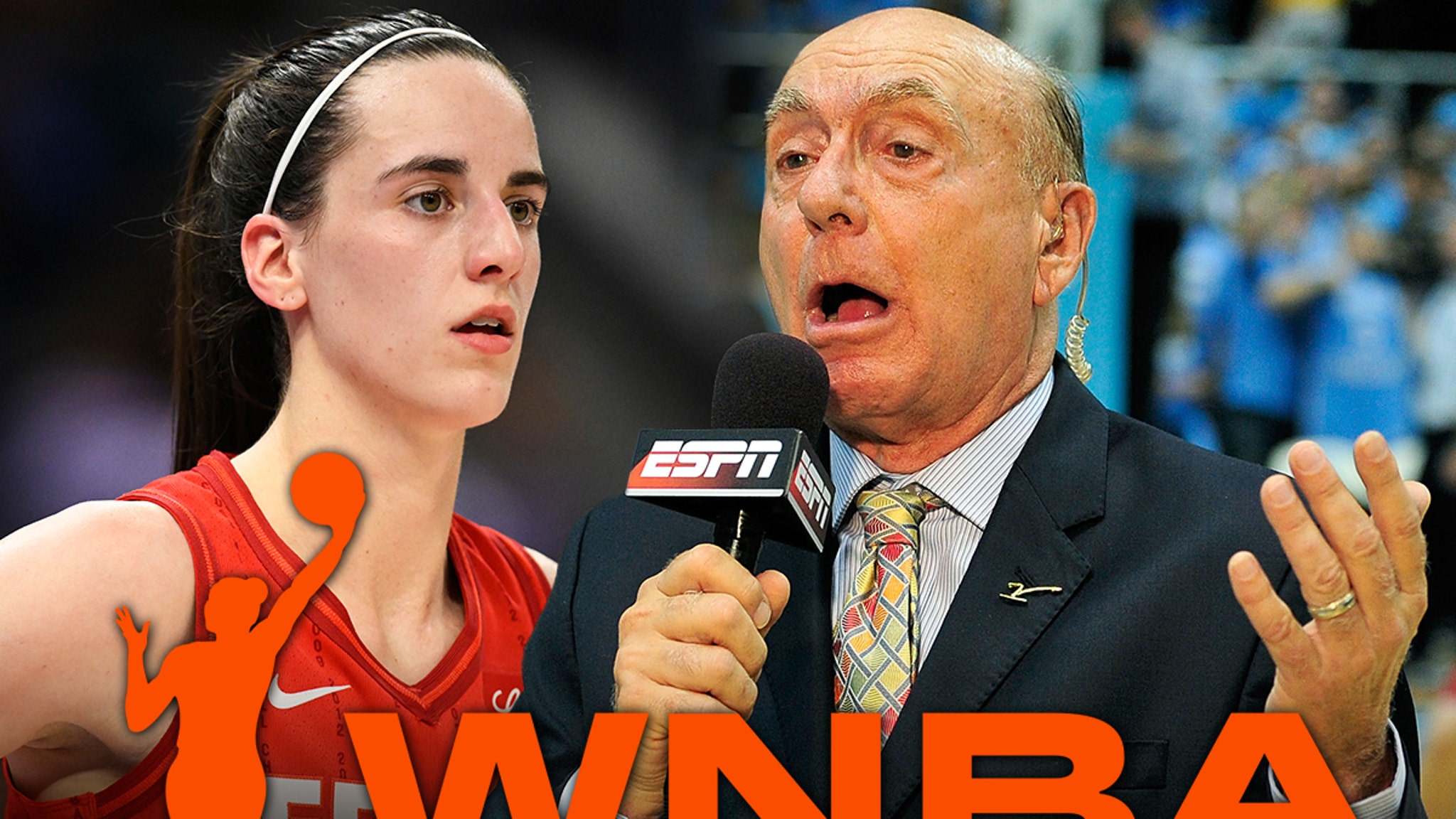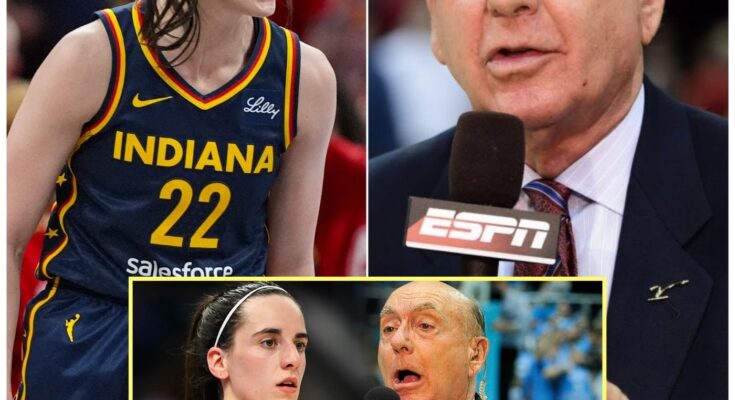Dick Vitale calls out WNBA players, saying jealousy influenced their vote, ranking Caitlin Clark as only the 9th best guard despite her huge impact on the league

Dick Vitale Calls Out WNBA Players: Claims Jealousy Behind Caitlin Clark’s Low Ranking Despite Her Game-Changing Impact
The world of women’s basketball is anything but quiet these days, and NBA Broadcasting Hall-of-Famer Dick Vitale is making sure of that. In a fiery social media post, the iconic commentator known for his enthusiasm and candor called out WNBA players for what he labelled as “jealousy,” blasting a recent vote by league players that ranked Indiana Fever rookie Caitlin Clark as only the ninth-best guard in the league. Vitale argues the vote fails to recognize the seismic impact Clark is having — both on and off the court — and raises tough questions about respect and bias in women’s basketball culture.
The Controversial List
The drama began when The Athletic released the results of its annual WNBA player poll—a survey conducted by the players themselves, not coaches or media. In a poll that asked, “Who are the top five guards in the WNBA right now?” Caitlin Clark, the record-smashing rookie from Indiana, came in at ninth place.
Clark has been the headline story of this WNBA season. Crowds follow her everywhere. Her Indiana Fever away games consistently sell out. Her jersey is the best-selling in the league. Ratings for WNBA broadcasts have skyrocketed. Yet, according to the players who lace up their sneakers against her every night, Clark is not even a top-five guard.

Vitale’s Verdict: “Jealousy, Baby!”
Dick Vitale didn’t hold back in his response.
“Let’s get real, baby! Caitlin Clark is transforming the WNBA before our eyes, and she’s being punished in these player polls because of pure JEALOUSY,” Vitale declared in a viral post. “She’s only ninth-best? C’mon, that’s a joke! Nobody is filling up arenas or drawing as many eyes to the league as Caitlin Clark. Don’t tell me this isn’t personal from these players who are jealous of the attention she’s getting. Recognize her IMPACT!”
It’s classic Vitale — direct and impassioned. But it also speaks to a larger debate rippling through the WNBA about what matters most: raw talent, veteran credibility, or the wider influence a player has on the game’s growth?
Clark’s Unprecedented Impact
There’s no denying Clark’s effect on the league. Drafted No. 1 this year after her electric NCAA career at Iowa, she arrived in the WNBA with an unprecedented following. On the stat sheet, Clark’s numbers are strong—though typical for rookies, marked by growing pains and flashes of brilliance. Yet, it’s her off-court influence that is rewriting the league’s story.
TV ratings for WNBA games are up over 200% compared to last year, and Clark’s games routinely outperform NBA playoff contests in viewership. Teams that would have struggled to fill seats in the past now see ticket demand through the roof when the Fever come to town. The so-called “Caitlin Clark Effect” has translated into sponsorships, media visibility, and a league-wide surge in attention.

Why the Player Pushback?
If you ask Clark’s coach, teammates, and legions of fans, her presence is a gift. But players across the league seem to have a more complicated relationship with the phenomenon.
A WNBA season is a grind, and for years, All-Stars like Chelsea Gray, Jewell Loyd, and Kelsey Plum have worked to establish women’s basketball as an elite, skill-driven sport. Many take pride in their hard-won status, built long before the lights of ESPN regularly pointed their way.
There’s also an undercurrent that Vitale is tapping into — a lingering narrative that white, college-educated athletes like Clark are more easily embraced (and commercialized) than Black stars who’ve dominated the league for years but received only a fraction of the coverage. Is the skepticism (or just plain cold shoulder) from veterans justified, or is it envy as Vitale claims?
Veterans vs. The New Wave
Legacy stars like Diana Taurasi and Sue Bird have spoken both about supporting the next generation but also the unique challenges rookies face. It’s an open secret that “earning your stripes” in the WNBA locker rooms can be as tough as making it onto league highlight reels. When Sabrina Ionescu arrived in the league as the top pick, she faced tough love from her peers as well. But Clark’s reception feels even more polarized.
After a number of physical on-court run-ins — from hard fouls to subtle trash talk — many observers believe that Clark’s arrival has introduced a unique form of competitive tension. Has she earned her place, or is she being fast-tracked to stardom? Vitale’s argument is that Clark has done more than enough to show she belongs, and that refusing to recognize her talent is not about facts or basketball — it’s personal.
What Really Matters: Performance or Growth?
The crux of the debate is this: should player rankings reflect only raw performance, or also account for impact on the league as a whole?
Critics of the list point out that Clark is still adapting to the superior athleticism and veteran guile of the WNBA, making youthful mistakes as she learns the league. But as Vitale and others argue, ignoring the fact that she’s single-handedly boosting the visibility and earning power of women’s basketball is willful blindness.
“If you’re bringing millions of people to women’s basketball, how are you not a top-five player in terms of IMPACT?” Vitale asked. “This is the kind of thing that moves the needle, baby!”
A League in Transition
What’s clear is that the WNBA is in a period of transformation. Players like Caitlin Clark, Angel Reese, and Cameron Brink are drawing millions of new fans. Social media chimes in on every play, and old truths about who counts, who gets paid, and whose story gets told are all up for renegotiation.
If the league hopes to capture this new energy, maybe it’s time for players and veterans to embrace the changing tide, even if it means sharing the spotlight. After all, as Dick Vitale knows well, the best leagues are built on both dazzling plays and dynamic personalities.
The Final Buzzer
The verdict is still out on where Clark will rank among the WNBA’s all-time greats. But when the history of this moment is written, Caitlin Clark’s rookie year will be remembered as the turning point when women’s basketball became must-see TV.
And as Dick Vitale would say: “That’s awesome, baby, with a capital A!”



